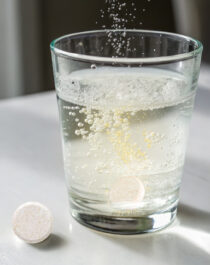Are You Getting Enough Vitamin D?
Vitamin D does more than just keep your bones strong! It has recently gained attention for its critical role in supporting immune defence. Known as the sunshine vitamin, your body primarily produces vitamin D in response to sun exposure.
Although Malaysia is a tropical country, many people still do not get enough sun exposure due to indoor lifestyles, office work, long hours in air-conditioned spaces, and the regular use of sunscreen. Only a few foods contain vitamin D naturally, such as salmon, tuna, trout, and mackerel. Some foods are fortified, like milk, cereals, and certain juices, but the amounts vary and may not be enough to meet daily needs.
Vitamin D Deficiency
Related Products
Vitamin D deficiency is more common than you may think. Insufficient vitamin D can lead to bone softening (osteomalacia) in adults and rickets in children. But deficiency can also show up in less obvious ways.
You are more likely to have low vitamin D levels if you:
- Spend most of your time indoors
- Have darker skin (higher melanin reduces vitamin D production)
- Are older
- Are overweight
- Frequently use sunscreen (which blocks UV needed for vitamin D synthesis)
Possible signs of low vitamin D include:
- Persistent fatigue
- Low mood or feelings of depression
- Poor sleep or irregular sleep patterns
- Frequent colds or infections
- Muscle weakness or aches
- Hair thinning or hair loss
These signs are often overlooked or mistaken for stress or exhaustion, but the root cause may be insufficient vitamin D.
Why Vitamin D Matters
Vitamin D influences far more than just your bones. When your vitamin D levels are low, your body may not function as efficiently, leaving you feeling weaker, more tired, and more vulnerable to illness. Maintaining healthy vitamin D levels helps your body stay strong, balanced, and resilient.
Some of the benefits of vitamin D include:
- Immune defence: Vitamin D helps activate the immune system, allowing your body to better combat illnesses. It plays a key role in protecting against respiratory infections.
- Bone health: Vitamin D promotes calcium absorption, supporting strong bones and reducing the risk of osteoporosis later in life.
- Muscle function: A lack of vitamin D can lead to poor muscle health, increasing the risk of falls and frailty as you age. Supplementation helps slow muscle loss and optimise strength.
- Mood regulation: Vitamin D deficiency has been linked to low mood and anxiety. Maintaining sufficient vitamin D levels may improve mood and help ward off depression.
Supplementing with Vitamin D
Taking a vitamin D supplement is an easy and effective way to meet your daily needs and prevent deficiency. Look for supplements formulated with a rice bran oil base for improved absorption. Vitamin D supplements are available in two main forms: vitamin D2 and vitamin D3.
Vitamin D3 | Vitamin D2 |
| Naturally occurring form of vitamin D | A synthetic form of vitamin D |
| Made by the skin upon sun exposure; found in food and most supplements | Made from plants, molds and yeasts in laboratories |
| More biologically active, significantly increases vitamin D levels in the body | Less biologically active, moderately increases vitamin D levels in the body |
| Longer shelf life in supplements | Shorter shelf life in supplements |
Keep Your Vitamin D Levels in Check
Vitamin D is vital for your immune system, bones, muscles, heart, and mood. Since it can be hard to get enough from sunlight and food alone, supplementing with the right form, such as vitamin D3, helps maintain healthy levels. With proper vitamin D intake, your body stays strong, resilient, and ready to face each day.














